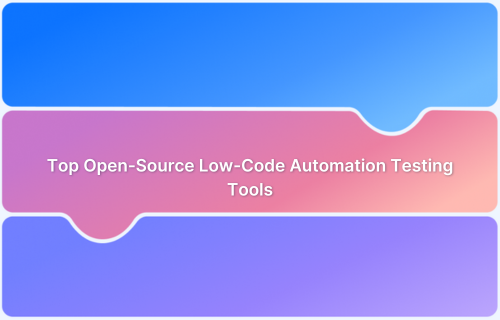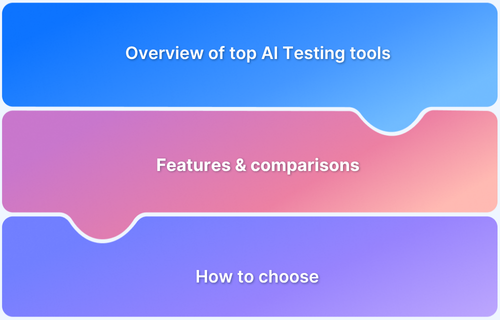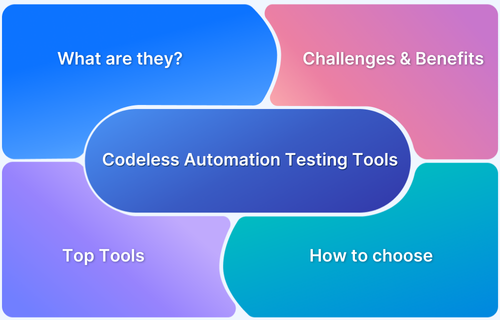Testim is a popular low-code automation tool known for fast test authoring and AI-powered maintenance.
However, its limitations around advanced validation, platform coverage, and pricing lead many teams to explore alternatives.
Overview
Top Testim Alternatives:
- BrowserStack Low-Code Automation: AI-powered self-healing with real-device access for cross-browser and mobile testing.
- Katalon Platform: Unified low-code automation across web, API, desktop, and mobile with AI-driven features.
- Reflect.run: No-code testing that records and automates web actions through a cloud browser.
- UI Bakery: Quick setup for scalable prototyping and internal app development without heavy coding.
- Appsmith: Open-source framework with strong integrations and community support for app creation.
- Appian: Enterprise automation platform with rich integrations and scalability for complex workflows.
- Xano: Backend platform that simplifies API setup and automation with a free demo option.
- Mendix: Agile low-code platform enabling collaboration and rapid multi-channel app delivery.
- Studio Creatio: Workflow and CRM automation with easy customization for business teams.
- Leapwork: Visual no-code automation using flowcharts with reusable workflows across systems.
- Rainforest QA: Cloud-based automation with on-demand crowd testing and zero setup required.
- Functionize: AI-powered codeless web testing with Chrome recording and enterprise scalability.
- Virtuoso: Low-code and no-code web testing using natural language and AI-driven authoring.
- Ghost Inspector: No-code web testing with browser extension recording and automated scheduling.
- Mabl: Low-code testing platform for web and mobile with AI maintenance and developer options.
This guide highlights the top Testim alternatives, comparing their strengths to help you choose the right solution for scalable, reliable test automation.
What is Testim?
Testim is an AI-powered low-code testing platform that helps teams build, execute, and maintain web application tests quickly.
Its visual recording, self-healing locators, and JavaScript extensibility make it suitable for both technical and non-technical contributors.
Key Use Cases:
- Automating functional and visual testing of web applications
- Reducing test flakiness with AI-driven self-healing locators
- Running cross-browser and regression tests to ensure UI consistency
- Extending tests with JavaScript for advanced scenarios and flexibility
Why Consider Testim Alternatives?
While Testim speeds up test creation and offers strong AI-driven maintenance, it has limitations that may not fit every team.
- Advanced visual validation features require additional paid add-ons
- Platform support is focused mainly on web applications
- Premium capabilities are gated behind higher subscription tiers
- Complex user flows can be harder to manage in the UI editor
Testim Alternatives: Quick Overview
Several platforms offer similar or enhanced capabilities compared to Testim. The table below highlights their pros, cons, and pricing for quick comparison.
| Tool | Pros | Cons | Free Plan |
|---|---|---|---|
| BrowserStack Low-Code Automation | AI-powered self-healing, real-device testing, low-code authoring, cross-browser & mobile testing | Advanced features require paid plans | ✅ Free plan with unlimited test creation |
| UI Bakery | Rapid app creation, flexible integrations | Learning curve, limited mobile support | ✅ |
| Appsmith | Open source, flexible deployment | Limited widgets, performance issues | ✅ |
| Appian | Enterprise scale, complex automation support | Expensive, steep learning curve | ❌ |
| Xano | Rapid backend development, scalable | No front-end, technical expertise required | ✅ |
| Mendix | Multi-channel apps, strong collaboration | Expensive, complex governance | ✅ |
| Studio Creatio | AI-powered workflows, scalable | No free plan, limited mobile support | ❌ |
| Leapwork | Visual flows, cross-platform | Expensive, complex setup | ❌ |
| Rainforest QA | No-code, combines AI & crowd testing | Web-only, costly | ❌ |
| Testim | Fast authoring, AI-driven maintenance | Paid advanced features | ✅ |
| Katalon Platform | AI-powered features, good for mixed skill teams | Some features in beta, performance varies | ✅ |
| Reflect.run | No-code browser testing, quick setup | Web-only, costly | ❌ |
| Functionize | AI-powered, scalable cloud execution | Enterprise focus, web-only | ❌ |
| Virtuoso | Natural-language test authoring, AI-driven healing | Limited advanced scripting, premium pricing | ❌ |
| Ghost Inspector | Simple browser-based recording, cross-browser support | Limited to web, restricted free plan | ✅ (limited) |
| Mabl | Low-code creation, AI-powered self-healing, developer options | Paid subscription required after trial | ❌ |
Top 15 Testim Alternatives
Below are the leading platforms teams often compare with Testim. Each tool provides distinct strengths to meet different testing and development needs.
1. BrowserStack Low-Code Automation
BrowserStack Low-Code Automation allows teams to build, run, and maintain tests without needing code.
With AI-powered self-healing and low-code authoring agents, it speeds up test creation by up to 10x and reduces build failures by up to 40%, delivering faster, more stable automation for both technical and non-technical users.
Key Features:
- Test Recorder: Easily capture user actions such as clicks and form entries and transform them into automated test steps that include both functional and visual validations.
- Readable Test Steps: Actions recorded are automatically translated into simple English instructions that are easy for any team member to read, review, and modify without technical expertise.
- AI-Powered Self-Healing: Uses artificial intelligence to detect when UI elements change and updates the test automatically to prevent failures, reducing the need for repetitive manual maintenance.
- Low-Code Authoring Agent: Uses AI to turn natural language prompts into executable test steps, automating tasks from simple instructions.
- Cross-Browser & Mobile Testing: Provides access to a real device cloud that includes thousands of browsers, operating systems, and mobile devices to ensure test accuracy across environments.
- Reusable Modules: Allows teams to save frequently used test sequences as reusable modules that can be inserted into multiple test cases to reduce duplication and simplify test maintenance.
- Private Environment Testing & Email Notifications: Enables secure testing on staging, localhost, and internal environments, while sending detailed email reports of build pass or fail status for stakeholder visibility.
Pricing:
- Free Plan: Offers unlimited test creation along with AI-generated test data, intelligent wait handling, API steps, secure private environment testing, video debugging, and 24×7 support.
- Paid Plan: Unlocks AI agents, advanced self-healing, parallel execution, and enterprise-grade features, with custom pricing based on organizational needs.
Get Started with BrowserStack Low Code Automation for Free
2. Katalon Platform
Katalon is a unified low-code automation solution that supports web, API, desktop, and mobile testing. Its AI features and intuitive interface make automation accessible across technical skill levels.
Key Features:
- Visual testing for UI regressions and image-based checks
- AI-powered TrueTest for user-journey discovery and maintenance
- Manual test creation directly from Jira issues
Pros:
- Collaborative platform for both technical and non-technical users
- Faster test cycles with AI assistance and analytics
- Seamless integration with CI/CD and test management tools
Cons:
- Some AI features are still evolving or limited in scope
- Complex logic may still require scripting
- Advanced enterprise options are restricted to premium tiers
Pricing: Free starter edition with limited features. Paid plans begin at $84 per user per month, with custom quotes for large teams.
Learn More: Top 15 AI Testing Tools
3. Reflect.run
Reflect is a no-code testing tool that uses a cloud browser to record and automate web actions, making it approachable for non-technical contributors.
Key Features:
- Cloud-based browser for interactive test creation
- Automatic selector generation to reduce test flakiness
- Native CI integrations with video and log capture
Pros:
- Simple and fast test creation for all skill levels
- Handles complex web interactions like drag-and-drop and file uploads
- Fully hosted infrastructure with detailed reporting
Cons:
- Limited primarily to browser and web testing
- Customization for dynamic applications can be challenging
- Higher usage leads to significant cost escalation
Pricing: 14-day free trial available. Paid plans start at $212 per month.
4. UI Bakery
UI Bakery allows users to create custom internal applications and dashboards rapidly, without learning advanced UI frameworks. Its platform offers deep data connectivity, a rich set of UI components, and optional coding for advanced use cases.
Key Features
- Integrates with SQL, NoSQL, REST APIs, and third-party data sources
- Visual workflow and design system with advanced branding controls
- Ability to add business logic using SQL, Python, or JavaScript
Pros
- Enables rapid data-driven app development
- Highly flexible data integration and transformations
- Secure deployments, RBAC, and audit logs for compliance
Cons
- Some learning curve for integrating advanced code logic
- Limited out-of-the-box mobile app support
- Bulk of templates focused on admin/internal tools
Pricing
- Free plan available (limited users)
- Paid plans start at $5/user/month or $10/developer/month; business and enterprise tiers offer more features
5. Appsmith
Appsmith is an open-source low-code platform for building responsive web apps and internal tools. It combines drag-and-drop widgets with backend connectivity and version control.
Key Features
- Extensive widget library with AI and database integrations
- Connects easily with REST/GraphQL APIs, databases, and SaaS apps
- Full logic customization using JavaScript, with built-in IDE and debugging
Pros
- Flexible deployment: Cloud, self-hosted, or air-gapped environments
- Built-in security: role-based access, SSO, audit logs
- Cost-effective for small teams (free for up to 5 users)
Cons
- Performance can bottleneck with complex pages/large data sets
- Limited widget library compared to some local competitors
- UI customizations sometimes require writing custom code
Pricing
- Free plan (up to 5 users) has limited features
- Business: $15/user/month; Enterprise: custom pricing
6. Appian
Appian is a robust enterprise platform focusing on end-to-end process automation and case management, offering both low-code and no-code experiences for automating complex workflows at scale.
Key Features:
- Process modeling and automation for end-to-end workflows
- Native AI/ML orchestration and analytics
- Out-of-the-box integrations with ERPs and legacy systems
Pros:
- Scales effectively for enterprise and regulated industries
- Manages complex, high-volume automation with strong governance
- Offers wide integration support for existing systems
Cons:
- Pricing is request-based and can be costly
- Less suitable for rapid prototyping or small projects
- Learning curve for non-technical business users
Pricing: Available on request for business and enterprise customers.
Also Read: Why No Code is the Future of Testing
7. Xano
Xano is a no-code backend platform for building APIs and logic-driven workflows, ideal for powering front-end apps or integrating complex business systems securely and scalably.
Key Features:
- Visual builder for backend workflows
- PostgreSQL-based relational database with import/export
- API builder for REST, GraphQL, and webhooks
Pros:
- Rapid backend prototyping and deployment
- High scalability with modern infrastructure support
- Flexible data modeling with strong API documentation
Cons:
- No built-in frontend builder, focused only on backend
- Requires technical expertise for advanced use
- Some enterprise-grade features available only in higher tiers
Pricing: Free plan with essentials. Paid plans start at $25 per month (Starter), $224 per month (Pro), with custom pricing for enterprise.
Learn More: Comprehensive Guide to Low-Code Development
8. Mendix
Mendix is a comprehensive low-code platform for building web, mobile, and IoT apps with model-driven development and AI-assisted automation, used for enterprise-scale agile delivery.
Key Features
- Visual IDE for data models, workflows, and UIs
- Embedded AI for app development (Maia) and machine learning
- Integrated DevOps/project management with collaboration tools
Pros
- Delivers multi-channel apps (native mobile, PWA, web) rapidly
- Enables collaboration across business, IT, and mixed agile teams
- Rich marketplace for templates, widgets, integrated components
Cons
- Steep learning curve for advanced logic and customization
- Pricing escalates for enterprise-grade features
- Complex governance and role management for larger organizations
Pricing
- Free tier has basic features, standard pricing is €900/month
9. Studio Creatio
Studio Creatio is a no-code platform focused on CRM, workflows, and enterprise automation, offering AI-powered design tools and strong compliance capabilities.
Key Features:
- Drag-and-drop workflow and integration design
- AI-assisted app and UI generation
- Pre-built business process templates
Pros:
- Empowers non-technical users with visual builders
- Scales well for complex enterprise workflows
- Provides robust compliance and governance options
Cons:
- Advanced features are tied to higher-priced tiers
- Limited support for mobile apps compared to desktop
- Minimum license requirements may exclude small teams
Pricing: Starts at $25 per user per month, with no free plan.
10. Leapwork
Leapwork is a visual no-code test automation platform that uses flowcharts for building tests across web, desktop, and enterprise applications.
Key Features
- Drag-and-drop flowchart-based test creator
- Cross-platform automation (web, desktop, legacy apps, SAP)
- Self-healing tests with AI/ML
Pros
- Fast onboarding for QA/business users and automation novices
- Enterprise-grade security, audit, and compliance features
- Flexible integrations for CI/CD, DevOps pipelines
Cons
- Some advanced automation limited without vendor onboarding
- May require infrastructure setup for optimal CI/CD use
- Occasional UI/UX quirks for very complex flows
Pricing: Custom Pricing
11. Rainforest QA
Rainforest QA is a cloud-based no-code automation platform for web apps, combining easy visual test authoring, machine intelligence, and on-demand crowd QA for fast test coverage.
Key Features
- Visual, no-code test authoring and editing
- Parallel test execution infrastructure
- Workflow integrations for CI/CD, Jira, Slack
Pros
- Fast test creation for teams with no coding skills
- Includes all infrastructure for automation and test management
- Human crowd QA augments automation for complex scenarios
Cons
- Limited to web applications only
- Costs can rise for large test volumes
- Enterprise features locked behind higher plans
Pricing: Custom
12. Functionize
Functionize is an AI-powered codeless testing platform that helps teams rapidly automate web testing via Chrome plugin recording and robust cloud infrastructure, blending simplicity with enterprise-grade features.
Key Features
- AI-driven test generation and self-healing capabilities
- Architect module for visual editing and complex test logic
- Cloud-hosted platform enables parallel test execution and scalability
Pros
- Low barrier to entry; tests can be built by product experts, not just developers
- Supports powerful assertions and complex flows
- Integrates easily with existing CI/CD and enterprise systems
Cons
- Enterprise focus may not suit very small teams
- Some features locked behind higher-priced tiers
- Learning curve for advanced AI and Architect component
Pricing: Custom
Also Read: Top 12 AI Automation Testing Tools
13. Virtuoso QA
Virtuoso offers low-code and no-code test automation for web apps using natural-language and AI-driven test authoring. Its cloud-first architecture scales for both manual and automated QA workflows.
Key Features
- NLP-based test scripting in plain English
- AI-powered automatic element discovery and test healing
- Parallel test execution on cloud devices/browsers
Pros
- High speed of authoring and reduced maintenance overhead
- Native integrations with CI/CD and reporting platforms
- Visual test creation is precise and stable across browser/device types
Cons
- Not suitable for desktop or mobile native apps
- Custom logic and advanced scripting may be restricted
- Full feature access and enterprise support priced at premium
Pricing: Custom
14. Ghost Inspector
Ghost Inspector is a no-code testing tool for automating and monitoring web applications, enabling teams to visually build, schedule, and run tests via browser extension and powerful cloud infrastructure.
Key Features
- Browser-based test recorder that supports complex web actions
- Visual editor for modifying, grouping, and scheduling tests
- Built-in integrations with Slack, GitHub, Jenkins, Trello, and more
Pros
- Incredibly simple for non-coders to get started
- Flexible scheduling and monitoring fit DevOps and QA workflows
- Test maintenance aided by element update automation
Cons
- Web-focused; lacks support for mobile native or desktop apps
- Advanced branching logic possible but less flexible than code-based frameworks
- Free tier limits test frequency and integrations
Pricing
- Starts at $109 per month
15. Mabl
Mabl is a low-code test automation platform that lets both technical and non-technical users create, run, and maintain web and mobile tests through an intuitive point-and-click interface.
It supports simple test creation while offering advanced options for complex scenarios, enabling collaboration and faster feedback.
Key Features
- Intuitive test recorder for web and mobile, including API testing and email, PDF, database validation
- AI-powered self-healing for tests to reduce maintenance when UIs change
- Seamless CI/CD, cloud-based parallel execution, and native integrations
Pros
- Accessible to all team members, regardless of coding expertise
- Machine learning-based test adaptation significantly reduces maintenance
- Supports unified end-to-end testing: UI, API, and advanced workflows
Cons
- Intelligent automation most effective for record-and-playback scenarios; advanced scripting handled via JS/Appium
- Not open source; requires paid subscription after trial
- Integrations with some popular test management tools are limited
Pricing: Custom
Also Read: 13 Open Source AI Testing Tools
Why Choose BrowserStack Low-Code Automation?
BrowserStack Low-Code Automation provides an end-to-end solution for fast and stable test automation. It is designed to help teams ship quality software quickly while maintaining flexibility and accuracy across environments.
Key Reasons To Choose BrowserStack Over Testim:
- Broader Test Coverage: Supports cross-browser, mobile, API, and private environment testing on real devices, while Testim is mainly focused on web applications.
- AI-Driven Stability: Combines AI-powered self-healing and low-code authoring agents to accelerate test creation and cut down failures, unlike Testim’s paid add-ons for advanced validation.
- Enterprise-Ready Scalability: Offers reusable modules, CI/CD integration, and detailed reporting to support growing teams, making it more suitable for large-scale enterprise adoption.
- Secure And Reliable Testing: Provides built-in support for internal and staging environments with instant email notifications, giving teams reliable results beyond basic web automation.
Conclusion
While Testim simplifies test automation for web applications, it may not suit every use case or budget. Alternatives like BrowserStack, Leapwork, and others provide broader coverage, scalability, and enterprise-ready features.
For teams seeking speed, stability, and real-device accuracy, BrowserStack Low-Code Automation stands out as the most complete choice to deliver quality at scale.








